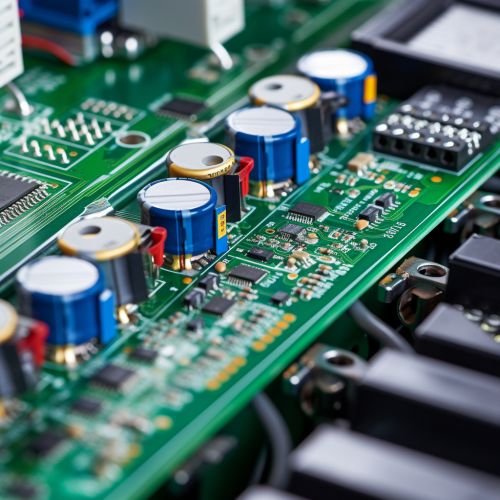Battery Management System
Overview
A Battery Management System (BMS) is an electronic system that manages a rechargeable battery (cell or battery pack), such as by protecting the battery from operating outside its Safe Operating Area, monitoring its state, calculating secondary data, reporting that data, controlling its environment, authenticating it and / or balancing it.
A Battery Management System may also monitor the state of the battery pack's environment and protect it from conditions that could be harmful. For example, it may monitor the temperature of the battery pack and if it gets too high, it can trigger a cooling fan or even disconnect the battery pack to prevent damage.


Functionality
A Battery Management System performs various functions related to the battery pack such as:
- Cell Monitoring: The BMS monitors the voltage and temperature of individual cells in the battery pack. This information is used to calculate the state of charge (SOC) and state of health (SOH) of the battery pack.
- Cell Balancing: The BMS can also balance the cells in the battery pack. This is done by transferring energy from higher energy cells to lower energy cells. This ensures that all cells in the battery pack have the same state of charge, which maximizes the capacity and lifespan of the battery pack.
- State of Charge Calculation: The BMS calculates the state of charge of the battery pack. This is done by integrating the current flowing into or out of the battery pack over time. The state of charge is an important parameter as it indicates how much energy is left in the battery pack.
- State of Health Calculation: The BMS calculates the state of health of the battery pack. This is done by comparing the capacity of the battery pack to its nominal capacity. The state of health is an important parameter as it indicates the condition of the battery pack.
- Protection: The BMS provides protection for the battery pack. This includes protection against overcharge, overdischarge, overcurrent, short circuit, and overtemperature. These protections are necessary to prevent damage to the battery pack and to ensure safe operation.
Types of Battery Management Systems
There are several types of Battery Management Systems, each with its own set of features and capabilities. These include:
- Centralized BMS: A centralized BMS has a single controller that monitors and controls the entire battery pack. This type of BMS is typically used in smaller battery packs.
- Distributed BMS: A distributed BMS has multiple controllers, each monitoring and controlling a section of the battery pack. This type of BMS is typically used in larger battery packs.
- Modular BMS: A modular BMS is a combination of a centralized BMS and a distributed BMS. It has a central controller that monitors and controls the entire battery pack, and additional controllers that monitor and control sections of the battery pack. This type of BMS is typically used in battery packs that require a high level of flexibility and scalability.
Applications
Battery Management Systems are used in a variety of applications including:
- Electric Vehicles: BMS are crucial in electric vehicles to ensure the battery operates within its safe operating area, to prolong the life of the battery, and to monitor and report the state of the battery.
- Energy Storage Systems: BMS are used in energy storage systems to manage and control the charge and discharge of the battery, to protect the battery from operating outside its safe operating area, and to monitor and report the state of the battery.
- Portable Devices: BMS are used in portable devices such as laptops, smartphones, and tablets to manage and control the battery, to protect the battery from operating outside its safe operating area, and to monitor and report the state of the battery.
Future Developments
As the demand for rechargeable batteries continues to grow, so too does the need for advanced Battery Management Systems. Future developments in BMS technology are likely to focus on improving the accuracy of state of charge and state of health calculations, enhancing cell balancing techniques, and integrating more advanced protection features.
